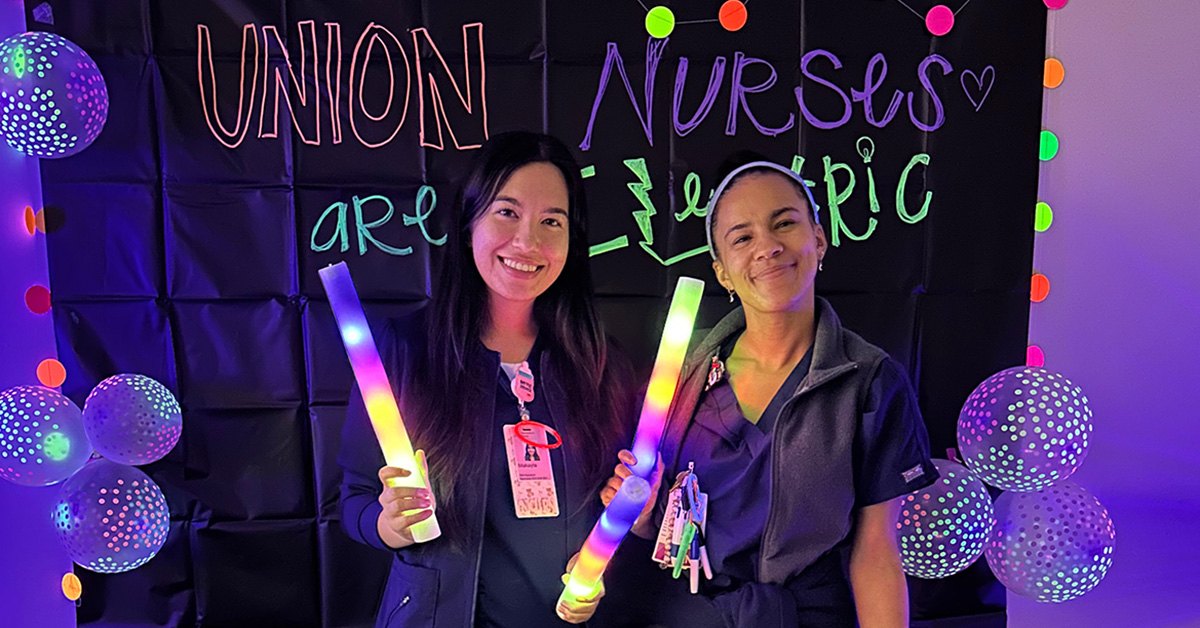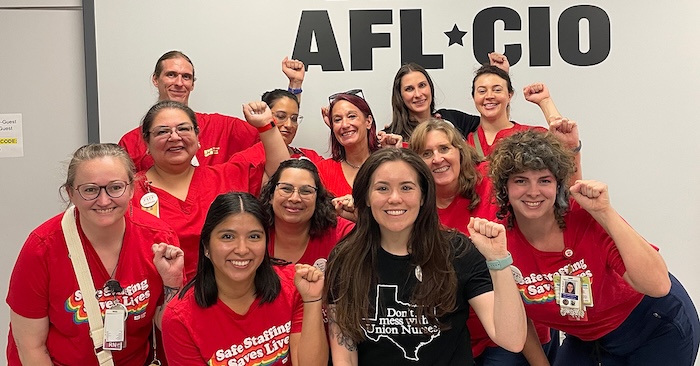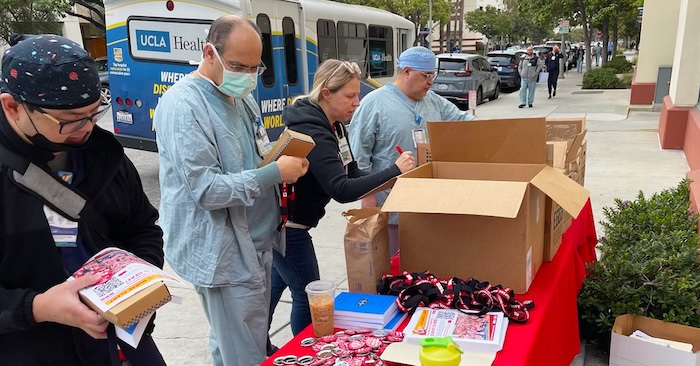Being Visible

Communication is key to developing a strong Professional Practice Committee
By Chuleenan Svetvilas
National Nurse magazine - April | May | June 2025 Issue
“Visibility is our tool,” says Kristine Kittleson, RN and member of the Professional Practice Committee (PPC) at Ascension Seton Medical Center Austin (ASMCA) in Austin, Texas. “Texas is a right-to-work state. The union is us. We have to be visible to keep our membership up, to keep up with recruitment.”
“Tabling is part of our monthly PPC meeting,” says Kristan Delmarty, RN and PPC member at the University of California, Los Angeles (UCLA) Medical Center in Santa Monica, and a California Nurses Association/National Nurses Organizing Committee board member. “It’s a way for nurses to get information and ask questions. The visibility of us being there is super important, especially around the contract negotiation process.”
Member outreach is a key element of internal organizing, whether nurses have been unionized for a few years or for decades. Kittleson and some 1,300 ASMCA nurses voted to join National Nurses Organizing Committee (NNOC), an affiliate of National Nurses United (NNU), in September 2022 and ratified their very first contract in March 2024. Their PPC began meeting in May 2024. For decades, NNU affiliate California Nurses Association (CNA) has fought for University of California (UC) RNs, currently representing 25,000 nurses across the system, including 1,200 nurses at UCLA Santa Monica where Delmarty works.
The PPC is an integral part of a CNA/NNOC collective bargaining agreement. This staff RN committee has the authority to document unsafe practices and the power to make real changes. Elected members of the PPC represent every major nursing unit, meeting in the hospital on paid time. The PPC also meets periodically with management to address issues of concern.
Here are some examples of how two Professional Practice Committees, one in Texas and another in California, reach out to nurses at their respective facilities.

Austin Outreach
One of the regular events organized by the PPC at Ascension Seton Medical Center Austin is what the nurses call “conference rooms.” At least once a month, the PPC, which has 10 RN members, will hold a PPC open house in a conference room for two to three hours during the day shift and another one during the night shift so they can reach as many nurses as possible. “It gives us time and space to have conversations with members and nonmembers,” said Kittleson, who works in the post-partum unit at ASMCA and is also the union’s chief nurse representative. “Nurses can flow in and engage when they can find time.”
To get the word out, they send a message to the members-only WhatsApp group and they hand out flyers. Each conference room event usually has food, union swag, flyers with information on current campaigns, union rights, and Assignment Despite Objection forms (ADOs), which gives union RNs the ability to report unsafe conditions and formally notify management of problems. ADOs are admissible in court, with regulatory agencies, and are protected under federal labor law. The PPC lets nurses know that it’s unlawful for the employer to discipline or retaliate against an RN for filing an ADO.
“We make our flyers based on what’s going on in the hospital,” says Monica Gonzalez, RN in ASMCA’s neurological medical-surgical unit and PPC member. “Right now, we have a flex issue going on, so we made flyers about that. If we have wins, we make a flyer and have it at our conference rooms and put it on each unit’s bulletin board.”
Rounding before each monthly PPC meeting is also a critical part of outreach. “By rounding and making our presence known in the hospital, being on the floor, we show our nonunion brothers and sisters that we’re doing the work,” says Vanessa Villareal, RN and chair of the PPC at ASMCA. “It makes them want to be involved. People see our faces and get to know us. Our coworkers know we are there for them.”
Their deep commitment to their coworkers, hospital, and community has resulted in more nurses coming to work at ASMCA because it is a union hospital. “We have to fight for everything, but our patients and coworkers deserve a better workplace,” said Villareal. “We try to be positive and lift each other up.”

UCLA’s seat at the table
At the Santa Monica campus of UCLA Medical Center, tabling and rounding are a routine part of each PPC meeting, which starts at 8 a.m. on the second Monday of every month. This PPC has been operating for more than 15 years. PPC members are on hand from 6:30 a.m. to 8 a.m. to catch night-shift RNs as they are leaving and day-shift nurses as they arrive. All 25 nurse representatives at UCLA Santa Monica also serve on the PPC.
Depending on the weather, PPC members will staff tables outside one of the entrances or inside by the cafeteria, distributing education and news about what’s going on at the facility or letting nurses know about upcoming union actions. If there are no active campaigns, the tables will have information about nurses’ rights, such as what is an ADO, what to do if called to a meeting with management, and more.
Labor representatives and as many PPC members/nurse reps as possible will also be at the tables. The nurse leaders let members in their units know when tabling and monthly town halls meetings are happening. “For my unit, I have a WhatsApp group where I share info and people can post info with the group,” says Delmarty, who has represented the pediatrics unit on the PPC since 2013, including serving as PPC chair for about five years. “We rely on nurse reps to make sure everyone knows what’s going on.”
“Nurses stop by and pick up whatever information they need to know and can ask questions,” said Delmarty, who also became chief nurse rep and a CNA/NNNOC board member in 2023. “We let people know we’re there for you.”
Tabling happens at least once a month but depending on what’s going on, the PPC also organizes additional pop-up tabling sessions, especially at critical times, such as during contract negotiations and strike votes. This year UC nurses are entering into contract negotiations so upcoming tabling sessions will include a member survey on what nurses want to focus on in contract negotiations. Additional events usually happen in the early morning or evening but they have also tabled during lunch time. During Nurses Week this year, the PPC also tabled twice to create even more opportunities to connect with coworkers.
The last hour of the PPC meeting, PPC members/nurse reps round various units across the hospital. They leave information in the break rooms and nurses are free to ask questions. They will go to different units, such as the ER, and drop off information to the nurses who could not come.
“We put in the work to develop trust with nurses, like the trust between nurses and patients,” says Delmarty. “Our patients trust us to speak up for them and to keep them safe. We’re doing that with our nurses."
Chuleenan Svetvilas is a communications specialist at National Nurses United.